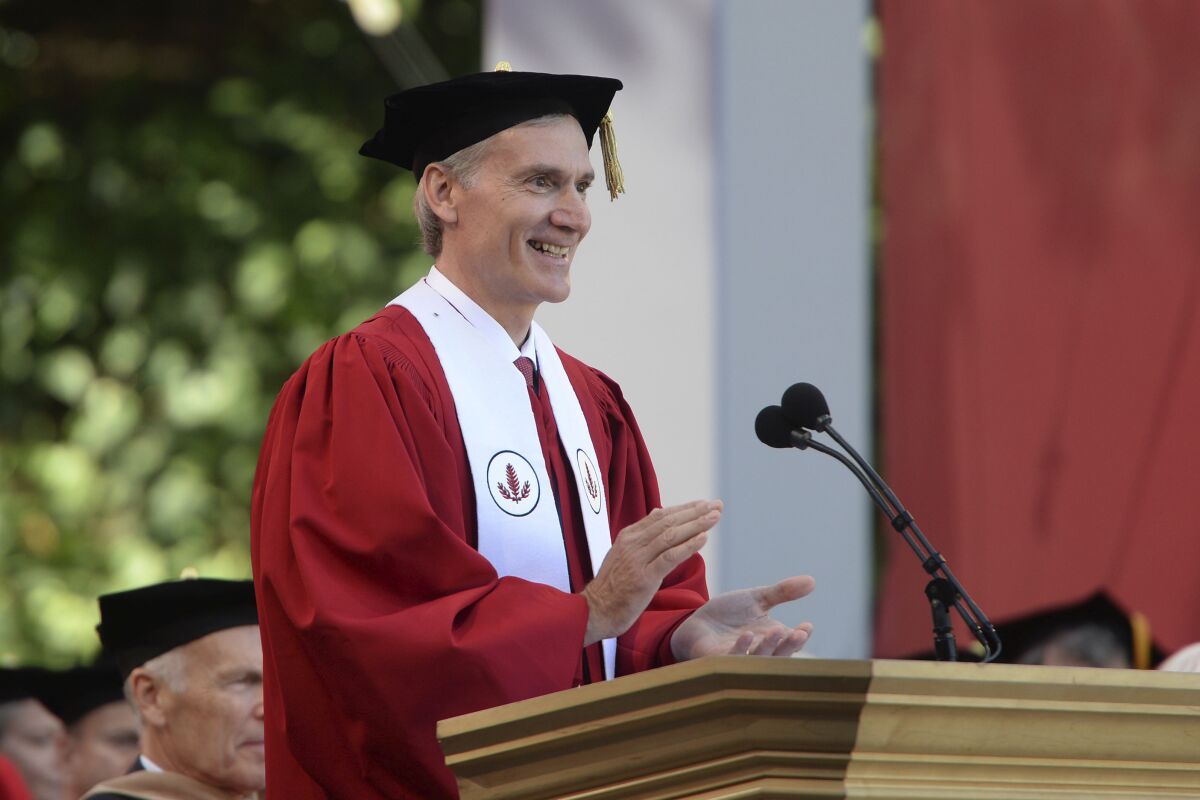The world is full of depressing news, so if you would rather read about that stuff, you won't find it here today. Instead, something else is concerning, and that is the role of college and university presidents. It's all about money. If the money does not flow in from the usual sources (corporate donors, wealthy alumni, or rich parents), the boards of the schools seek to force out those who are not great fundraisers, and seek to find leaders who excel in bringing in the cash. There are examples of many schools that have been rock stable for decades, and suddenly these jobs are like athletic coaches; if you win, you stay and if you lose you are gone. What does this do to the integrity and quality of any organization which is supposedly in existence to teach and foster the leaders of tomorrow? It is a difficult situation for any CEO of an institution of higher learning, and I do not have any quick and easy response to this sad situation. This story from today's LA Times.
Opinion: Why are so many college presidents resigning?

Marc Tessier-Lavigne at his inauguration as president of Stanford University on Oct. 21, 2016. He announced his resignation as president on July 19, but will keep his post as a biology professor. That's a clue to his real reasons for the move.
(Dan Honda/Bay Area News Group via Associated Press)
JULY 25, 2023 5:30 AM PT
It's hardly news by now that college presidencies are not what they used to be. The change is the result of factors as diverse as the institutions they lead. Yet despite the differences, certain similarities emerge among all college presidents.
First and foremost is their need to keep money flowing into their institutions' coffers. As long as they do, they'll hold onto their jobs. A series of recent resignations confirms that the truth is almost always found by following the money trail.When an independent review of his research found that it fell below the standards of scientific rigor, Marc Tessier-Lavigne promptly announced that he would resign as president of Stanford University, a post he has held since 2016.
Even his defenders mostly don't question the work done by a panel that reviewed more than 50,000 documents, leading to an 89-page report. It was thorough and unbiased. But what is hard to swallow is the reason that Tessier-Lavigne gave for his decision.
He said the report calls into serious question his ability to lead Stanford into the new academic year. Wait — he was cleared of fraud, so why does he somehow feel incapable of staying on as president? The presidency is strictly an administrative position that's pretty far removed from research. If anything, he might have resigned from his other post, as a professor of biology, given that role's proximity to research. But so far, he hasn't said he will relinquish that post.
Could it be that the real reason is the effect the report will most certainly have on fundraising?
That's highly likely in light of the reasons for other college presidential resignations over the last few years. USC and the University of Rochester are cases in point. What they demonstrate makes Tessier-Lavigne's decision all the more predictable. In both cases, the presidents stepped down because of their failure to maintain an atmosphere in which all students felt free from sexual harassment — not because of research flaws.
USC made larger headlines because of a series of scandals. One involved a longtime gynecologist at its health center who had abused female students for decades. The other involved the former dean of its medical school, who used drugs and partied with prostitutes.
At the University of Rochester, a 207-page report by an outside investigator found that allegations of sexual harassment were "exaggerated and misleading in many respects." Nevertheless, the president announced his resignation even before seeing the report.
At Stanford, Tessier-Lavigne took less than a week to do so.
Few college presidents oversee a campus that is totally free of complaints. So why do they so quickly announce their resignations when certain issues bubble up? It happens even when there's no apparent legal liability attached to the school.
In the final analysis, the answer is that the issues are too volatile for the public — and donors — to ignore until a plausible change has been made. When the universities involved are private, the financial support from alumni is crucial. Graduates are willing to cut them some slack over research flaws but not over sexual and racial issues.
The latter was on display in July when the president of Texas A&M University resigned after a controversy over attempts to hire a prominent Black professor to jump-start the school's journalism program. As a public university, it is highly sensitive to events with the potential to play poorly in the state Legislature. That's particularly true in Texas, with its Republican-dominated body that has a history of targeting public education. Although Katherine Banks, A&M's outgoing president, said in her resignation letter that "negative press has become a distraction," what she surely meant is that if she stuck around, the controversy would result in reduced funding from the state.
No matter what the issue, college presidencies these days are bound to be short-lived. That's because students are seen first and foremost as customers who must be catered to for their tuition dollars. Despite the high-blown rhetoric about developing critical thinkers, the No. 1 goal is to keep the money flowing. As long as presidents can do that, they'll weather any storm. When they can't, they're out.
****
Juan
Juan
Q. What is the difference between a law-abiding gun owner and a criminal?
A. The .2 of a second that it takes to pull a trigger.

No comments:
Post a Comment